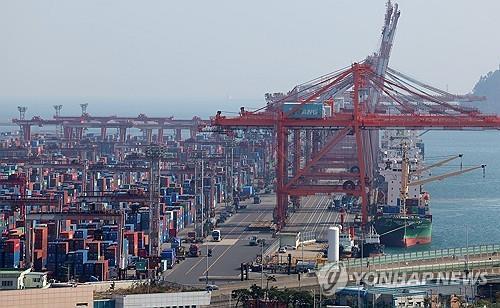- California Assembly OKs highest minimum wage in nation
- S. Korea unveils first graphic cigarette warnings
- US joins with South Korea, Japan in bid to deter North Korea
- LPGA golfer Chun In-gee finally back in action
- S. Korea won’t be top seed in final World Cup qualification round
- US men’s soccer misses 2nd straight Olympics
- US back on track in qualifying with 4-0 win over Guatemala
- High-intensity workout injuries spawn cottage industry
- CDC expands range of Zika mosquitoes into parts of Northeast
- Who knew? ‘The Walking Dead’ is helping families connect
Korea’s economy grows 1.3 pct in Q1, matching earlier estimate: BOK
South Korea’s economy grew at the fastest pace in over two years in the first quarter of the year as the recovery in exports continued and private spending remained firm, central bank data showed Wednesday.
The country’s real gross domestic product — a key measure of economic growth — increased 1.3 percent on-quarter in the January-March period, matching an earlier estimate, according to preliminary data from the Bank of Korea (BOK).
The first-quarter expansion compares with the 0.5 percent on-quarter expansion in the September-December period and marks the highest since the fourth quarter in 2021, when the economy expanded 1.6 percent.
On a yearly basis, South Korea’s economy advanced 3.3 percent in the first quarter, higher than the 2.1 percent growth for the last quarter of 2023.
All data were compiled on the base year of 2020, according to the bank.
“The second quarter may see an adjustment in the economic growth because of an extremely high expansion in the first quarter,” an official at the BOK said. The official said the country’s economic growth will move upward from the third quarter of the year.
Private spending logged a 0.7 percent rise in the January-March period, accelerating from the previous quarter’s 0.4 percent.
The country’s exports climbed 1.8 percent in the first quarter, slowing from the previous quarter’s 3.9 percent gain.
Government spending increased 0.8 percent, and construction investment went up 3.3 percent in the first quarter, a shift from the previous quarter’s 3.8 percent dip, according to the data.
The data came as the country’s inflation stayed below 3 percent for the second consecutive month in May.
Consumer prices, a key gauge of inflation, rose 2.7 percent on-year last month, compared with the 2.9 percent on-year rise a month earlier, marking the second straight month that the price growth slowed down and the figure stayed below 3 percent.
Last month, the central bank held its key interest rate steady at 3.5 percent for the 11th straight time as it weighs a slower-than-expected moderation in inflation and raised the growth estimate for the year.
The rate freezes came after the BOK delivered seven consecutive rate hikes from April 2022 to January.
As a result of a change in the base year, the country’s gross domestic product (GDP) reached 2,401 trillion won (US$1.74 trillion) last year, up from the previous 2,236 trillion won, according to the central bank.
Based on the new base year, the ratio of household debt to GDP fell to 93.5 percent last year from the previous 100.4 percent.
The updated data showed the country expanded at an average of 3.6 percent between 2001 and 2023, higher than the previous 3.5 percent.
South Korea’s economic growth slowed to the lowest in three years last year due to a slump in exports amid tightening monetary policies around the globe.
The economy expanded 1.4 percent last year, slowing from 4.3 percent growth in 2021 and a 2.6 percent advance in 2022.
The 2023 expansion marks the lowest since a 0.7 percent contraction in 2020 during the coronavirus pandemic.
For the year, the bank expects the economy to rebound slightly, at 2.5 percent.













